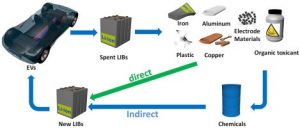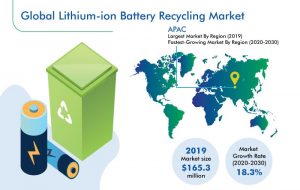The lithium-ion batteries are first made safe for mechanical treatment, with plastics, aluminium and copper separated and directed to their own recycling processes. And what is left of the battery after these processes are the chemical and mineral components, the ‘black mass’ and ‘black mass’ can be treated on an industrial scale. The black mass typically consists of a mixture of lithium, manganese, cobalt and nickel in different ratios. Of these, nickel, cobalt and lithium are the most valuable and most difficult to recover. Most of today’s recycling solutions for EV batteries are not able to recover these valuable minerals.
Related project: - Lithium Ion Battery

One of the greatest issues driving lithium-ion battery recycling is one of waste management – but it is not correct to say that all of the batteries being manufactured today are headed for landfill. When a lithium-ion battery comes to the end of its life, it still retains around 80% of its charge – and while that’s not enough to serve an electric vehicle, it’s good enough for a variety of different applications, such as energy storage. These second-life batteries could be used for at least 10 years. This kind of reuse is preferable in the first instance to recycling, because they’re extremely valuable – and recycling is costly. ‘The material in a Tesla battery, for example, is worth around $1500 (£1200) – but the market value is between $10,000 and $15,000, ‘If you want to get hold of that material value, you have to disassemble it, you have to crush it, you have process it in some kind of recycling process and then you only have a couple hundred dollars.’
The demand for these battery packs is large – the world’s biggest operator of telecommunication towers, China Tower, intends to replace the lead-acid batteries used for back-up power at almost all of their 2 million tower base stations with second-life lithium-ion batteries. That’s 54GWh of battery storage – or around 2 million batteries. In this way, reuse can play a role in adding value and providing the recycling industry with time to pull together the necessary infrastructure to recycle batteries at scale.
Related books:- Automobile Industry, Automotive Components & Allied Products Engine Parts, Piston, Pin, Piston Ring, Valve, Control Cable, Engine Mounting, Auto Lock, Disc Brake, Drum, Gear, Leaf Spring, Shock Absorber, Silencer, Chain, Cylinder Block, Chassis, Battery
The Market Growth of Lithium-Ion Battery Recycling Market
The lithium-ion battery recycling market is estimated at USD 1.5 billion in 2019 and projected to grow from USD 12.2 billion in 2025 to USD 18.1 billion by 2030, at a CAGR of 8.2% from 2025 to 2030. Rising investments in the development of electric vehicles are some of the key opportunities for the lithium-ion battery recycling market. Most companies have started recycling lithium-ion batteries as there is low accessibility for some of the raw materials such as lithium and cobalt.

Automotive is the largest segment in the global lithium-ion battery market, followed by the industrial and power segments. Lithium-ion batteries are being used in significant quantities for automotive propulsion. Since these batteries offer high energy and power density, there is an increasing demand for them, and this trend is expected to continue during the forecast period.
Lithium-ion manganese oxide is expected to be the highest-recycled battery types in the lithium-ion battery recycling market, by battery chemistry during the forecast period 2025–2030. The increasing adoption of lithium-ion manganese oxide batteries for power tools, medical devices, and electric powertrains is one of the key factors driving the growth of the lithium-ion battery recycling market globally.
Related videos: - Renewable Energy Sector, Green Power, Solar Energy, Biofuel, Hydroelectric, Wind, Non-conventional Energy, New and Renewable Energy
Conclusion
The report by NPCS has helped many of the engineers, project consultants & industrial consultancy firms in India and worldwide. You can get this and other project reports too on the official website of NPCS. Many of the engineers, project consultant & industrial consultancy firms in India and worldwide use our project reports as one of the input in doing their analysis.
Noo_Art21
Tags:-
#DetailedProjectReport #businessconsultant #BusinessPlan
#feasibilityReport #NPCS #industrialproject #entrepreneurindia #startupbusiness #BusinessIdeas #StartupBusinessIdeas #BusinessOpportunity #LithiumIonBattery #LithiumIonBatteryProduction #LithiumIonBatteryIndustry #LithiumIonBatteryManufacturing #ElectricVehicles #ElectricVehiclesIndustry #ElectricVehiclesProduction #ElectricalIndustry #ElectricIndustry #RenewablePower